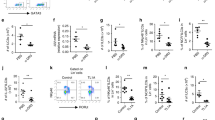Abstract
Background. To assess the contribution of IL-6 signaling to the physiopathology of Crohn’s disease, we introduced anti-IL-6 receptor monoclonal antibody to a murine colitis model. Methods. Colitis was induced in C.B-17-scid mice to which were transferred CD45RBhigh CD4+ T cells from Balb/c mice. Anti-IL-6 receptor monoclonal antibody or rat IgG was given intraperitoneally after T-cell transfer, followed by weekly injection. Vascular adhesion molecules and inducible nitric oxide synthase were visualized by immunostaining. Cytokine expression was determined by RT-PCR, and apoptotic cells were determined by the TUNEL method. Results. Mice treated with anti-IL-6 receptor monoclonal antibody showed normal growth while controls lost weight. Colitis was improved histologically with reduced infiltration of LFA-1+ monocytes/ macrophages and VLA-4+ T cells. ICAM-1 and VCAM-1 expression in the colonic vascular endothelium was markedly suppressed by the treatment, whereas no significant difference was seen in MAdCAM-1. IFN-γ, TNF-α, and IL-lβ mRNAs were markedly reduced, but no difference was observed in the expression of IL-4, IL-10, and TGF-β. Inducible nitric oxide synthase was upregulated in the mucosa of colitic mice and downregulated in the treated mice. Apoptotic cells were very sparse despite massive CD4+ T-cell infiltration in colitic mice, whereas increased apoptosis was seen in the treated mice with an apparently reduced number of T cells. Conclusions. Anti-IL-6 receptor monoclonal antibody abrogated murine colitis. It effectively blocked the expression of adhesion molecules, thereby blocking leukocyte recruitment, and increased T-cell apoptosis. These results strongly suggest the therapeutic potential of anti-IL-6 receptor monoclonal antibody for human Crohn’s disease.
Similar content being viewed by others
References
Targan SR, Hanauer SB, van Deventer SJH, Mayer L, Present DH, Braakman T, et al. A short-term study of chimeric monoclonal antibody cA2 to tumor necrosis factor α for Crohn’s disease. N Engl J Med 1997;337:1029–35.
Charles P, Elliott MJ, Davis D, Potter A, Kalden JR, Antoni C, et al. Regulation of cytokines, cytokine inhibitors, and acute-phase proteins following anti-TNF-α therapy in rheumatoid arthritis. J Immunol 1999;163:1521–28.
Kishimoto T, Akira S, Taga T. Interleukin-6 and its receptor: a paradigm for cytokines. Science 1992;258:593–7.
Kanazawa S. Expression of IL-6 and TNF-α in Crohn’s disease intestine. Med J Osaka Univ 1998;50:33–42.
Peters M, Müller AM, Rose-John S. Interleukin-6 soluble interleukin-6 receptor: direct stimulation of gpl30 and hematopoiesis. Blood 1998;92:3495–504.
Desgeorges A, Gabay C, Silacci P, Novick D, Roux-Lombard P, Grau G, et al. Concentrations and origins of soluble interleukin-6 receptor-a in serum and synovial fluid. J Rheumatol 1997;24:1510–6.
Mitsuyama K, Toyonaga A, Sasaki E, Ishida O, Ikeda H, Tsuruta O, et al. Soluble interleukin-6 receptors in inflammatory bowel disease: relation to circulating interleukin-6. Gut 1995;36:45–9.
Yamamoto M, Yoshizaki K, Kishimoto T, Ito H. IL-6 is required for the development of Thl cell-mediated murine colitis. J Immunol 2000;164:4878–82.
Picarella D, Hurlbut P, Rottman J, Shi X, Butcher E, Ringler DJ. Monoclonal antibodies specific for β7 integrin and mucosal addressin cell adhesion molecule-1 (MAdCAM-1) reduce inflammation in the colon of SCID mice reconstituted with CD45RBhigh CD4+ T cells. J Immunol 1997;158:2099–106.
Ayroldi E, Zollo O, Cannarile L, D’Adamio F, Grohmann U, Delfino DV, et al. Interleukin-6 (IL-6) prevents activation-induced cell death: IL-2-independent inhibition of fas/fasL expression and cell death. Blood 1998;92:4212–9.
Ito H, Fathman CG. CD45RBhigh CD4+ T cells from IFN-γ knockout mice do not induce wasting disease. J Autoimmun 1997;10:455–9.
Matsusaka T, Fujikawa K, Nishio Y, Mukaida N, Matsushima K, Kishimoto T, et al. Transcription factor NF-IL6 and NF-kB synergistically activate transcription of the inflammatory cytokines, interleukin 6 and interleukin 8. Proc Natl Acad Sci USA 1993; 90:10193–7.
Ohshima S, Saeki Y, Mima T, Sasai M, Nishioka K, Nomura S, et al. Interleukin 6 plays a key role in the development of antigen-induced arthritis. Proc Natl Acad Sci USA 1998;95:8222–6.
Samoilova EB, Horton JL, Hilliard B, Liu TST, Chen Y. IL-6-deficient mice are resistant to experimental autoimmune encephalomyelitis: roles of IL-6 in the activation and differentiation of autoreactive T cells. J Immunol 1998;161:6480–6.
Koizumi M, King N, Lobb R, Benjamin C, Podolsky DK. Expression of vascular adhesion molecules in inflammatory bowel disease. Gastroenterology 1992;103:840–7.
Romano M, Sironi M, Toniatti C, Polentarutti N, Fruscella P, Ghezzi P, et al. Role of IL-6 and its soluble receptor in induction of chemokines and leukocyte recruitment. Immunity 1997;6:315–25.
Ogawa H, Yamamoto M, Nakamura H, Ito H. Role of inducible nitric oxide synthase in murine colitis. In: Asakura H, Aoyagi Y, Nakazawa S, editors. Trends in gastroenterology and hepatology. Tokyo: Springer; 2001. p. 99–102.
Ina K, Itoh J, Fukushima K, Kusugami K, Yamaguchi T, Kyokane K, et al. Resistance of Crohn’s disease T cells to multiple apoptotic signals is associated with a Bcl-2/Bax mucosal imbalance. J Immunol 1999;163:1081–90.
Atreya R, Mudter J, Finotto S, Müllberg J, Jostock T, Wirtz S, et al. Blockade of interleukin 6 trans signaling suppresses T-cell resistance against apoptosis in chronic intestinal inflammation: evidence in Crohn disease and experimental colitis in vivo. Nat Med 2000;6:583–8.
Author information
Authors and Affiliations
Rights and permissions
About this article
Cite this article
Ito, H., Hirotani, T., Yamamoto, M. et al. Anti-IL-6 receptor monoclonal antibody inhibits leukocyte recruitment and promotes T-cell apoptosis in a murine model of Crohn’s disease. J Gastroenterol 37 (Suppl 14), 56–61 (2002). https://doi.org/10.1007/BF03326415
Published:
Issue Date:
DOI: https://doi.org/10.1007/BF03326415




